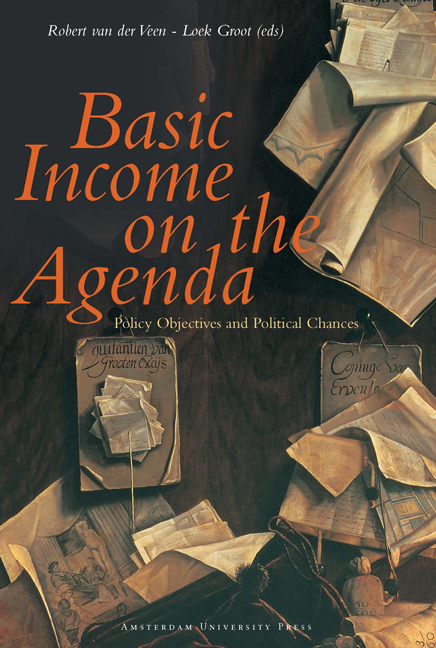Basic Income at the Heart of Social Europe? Reply to Fritz Scharpf
Published online by Cambridge University Press: 23 January 2021
Summary
No nonsense. This is the tone of Fritz Scharpf 's contribution. This is the language which basic income supporters must be able to grasp – and willing to hear – at least if they are not to degenerate into a motley assembly of soft-minded do-gooders; if they are not to be ruthlessly driven into the margins by a harsh, uncompromising reality, but instead to help shape the future in accordance with their visions of freedom and equality. Not through relentless, repetitive preaching, but by means of the resolute and astute action which they must aim to inspire and guide, but will never successfully steer unless they adopt the no-nonsense attitude advocated and practised by Fritz Scharpf.
Goals: Moral Integrity
No nonsense, first of all, about goals. Fritz Scharpf ‘consider[s] mass unemployment, forced inactivity, and the exclusion from the processes of social production, a much greater challenge to the moral integrity of Western European societies than the frustration of leisure preferences’. So do I. Indeed, it is the plight of the excluded Scharpf has in mind, not the whims of Malibu surfers, which has been driving me all along, first in my interest in, and second in my advocacy of, an unconditional basic income. But beware: the implied conception of the ‘moral integrity of Western European societies’ need not grant any intrinsic superiority to paid work over so-called ‘leisure’. Nor does it need to be inconsistent with formulating the ultimate objective in terms of freedom. For exclusion from paid employment and all associated material and nonmaterial advantages is clearly a major impediment to many people's real freedom to do whatever they might wish to do with their lives.
However, if ‘real freedom for all’ is, as I believe, the best interpretation of ‘moral integrity’ as an overarching aim – rather than, say, enlisting people into labour as much as reasonably possible – then the way in which access to a job is meant to be secured to all is of utmost importance. For if freedom is what matters, a strong presumption directly follows in favour of ways of helping people into jobs that give the least well equipped among them (or the least well connected or lucky) the widest possible range of choice among the jobs – full-time and part-time, waged and self-employed – they might want to take up.
- Type
- Chapter
- Information
- Basic Income on the AgendaPolicy Objectives and Political Chances, pp. 161 - 169Publisher: Amsterdam University PressPrint publication year: 2000
- 2
- Cited by



